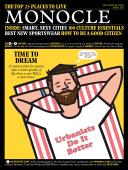
Issue 125
Time to dream. A summer plan for anyone after a better quality of life, from a new HQ to a nicer home. Plus, our annual Quality of Life survey.
In This Issue
Oops! No content was found.
Looks like we no longer have content for the page you're on. Perhaps try a search?
Return Home

